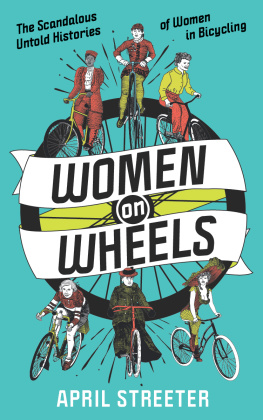Herbert Wells - The Wheels of Chance: a Bicycling Idyll
Here you can read online Herbert Wells - The Wheels of Chance: a Bicycling Idyll full text of the book (entire story) in english for free. Download pdf and epub, get meaning, cover and reviews about this ebook. year: 1998, genre: Prose / Humor. Description of the work, (preface) as well as reviews are available. Best literature library LitArk.com created for fans of good reading and offers a wide selection of genres:
Romance novel
Science fiction
Adventure
Detective
Science
History
Home and family
Prose
Art
Politics
Computer
Non-fiction
Religion
Business
Children
Humor
Choose a favorite category and find really read worthwhile books. Enjoy immersion in the world of imagination, feel the emotions of the characters or learn something new for yourself, make an fascinating discovery.

- Book:The Wheels of Chance: a Bicycling Idyll
- Author:
- Genre:
- Year:1998
- Rating:4 / 5
- Favourites:Add to favourites
- Your mark:
- 80
- 1
- 2
- 3
- 4
- 5
The Wheels of Chance: a Bicycling Idyll: summary, description and annotation
We offer to read an annotation, description, summary or preface (depends on what the author of the book "The Wheels of Chance: a Bicycling Idyll" wrote himself). If you haven't found the necessary information about the book — write in the comments, we will try to find it.
The Wheels of Chance: a Bicycling Idyll — read online for free the complete book (whole text) full work
Below is the text of the book, divided by pages. System saving the place of the last page read, allows you to conveniently read the book "The Wheels of Chance: a Bicycling Idyll" online for free, without having to search again every time where you left off. Put a bookmark, and you can go to the page where you finished reading at any time.
Font size:
Interval:
Bookmark:
THE WHEELS OF CHANCE:
A BICYCLING IDYLL
By H.G. Wells
I.
THE PRINCIPAL CHARACTER IN THE STORY
If you (presuming you are of the sex that does such things)if you had gone into the Drapery Emporiumwhich is really only magnificent for shopof Messrs. Antrobus & Co.a perfectly fictitious "Co.," by the byeof Putney, on the 14th of August, 1895, had turned to the right-hand side, where the blocks of white linen and piles of blankets rise up to the rail from which the pink and blue prints depend, you might have been served by the central figure of this story that is now beginning. He would have come forward, bowing and swaying, he would have extended two hands with largish knuckles and enormous cuffs over the counter, and he would have asked you, protruding a pointed chin and without the slightest anticipation of pleasure in his manner, what he might have the pleasure of showing you. Under certain circumstancesas, for instance, hats, baby linen, gloves, silks, lace, or curtainshe would simply have bowed politely, and with a drooping expression, and making a kind of circular sweep, invited you to "step this way," and so led you beyond his ken; but under other and happier conditions,huckaback, blankets, dimity, cretonne, linen, calico, are cases in point,he would have requested you to take a seat, emphasising the hospitality by leaning over the counter and gripping a chair back in a spasmodic manner, and so proceeded to obtain, unfold, and exhibit his goods for your consideration. Under which happier circumstances you mightif of an observing turn of mind and not too much of a housewife to be inhumanhave given the central figure of this story less cursory attention.
Now if you had noticed anything about him, it would have been chiefly to notice how little he was noticeable. He wore the black morning coat, the black tie, and the speckled grey nether parts (descending into shadow and mystery below the counter) of his craft. He was of a pallid complexion, hair of a kind of dirty fairness, greyish eyes, and a skimpy, immature moustache under his peaked indeterminate nose. His features were all small, but none ill-shaped. A rosette of pins decorated the lappel of his coat. His remarks, you would observe, were entirely what people used to call cliche, formulae not organic to the occasion, but stereotyped ages ago and learnt years since by heart. "This, madam," he would say, "is selling very well." "We are doing a very good article at four three a yard." "We could show you something better, of course." "No trouble, madam, I assure you." Such were the simple counters of his intercourse. So, I say, he would have presented himself to your superficial observation. He would have danced about behind the counter, have neatly refolded the goods he had shown you, have put on one side those you selected, extracted a little book with a carbon leaf and a tinfoil sheet from a fixture, made you out a little bill in that weak flourishing hand peculiar to drapers, and have bawled "Sayn!" Then a puffy little shop-walker would have come into view, looked at the bill for a second, very hard (showing you a parting down the middle of his head meanwhile), have scribbled a still more flourishing J. M. all over the document, have asked you if there was nothing more, have stood by yousupposing that you were paying cashuntil the central figure of this story reappeared with the change. One glance more at him, and the puffy little shop-walker would have been bowing you out, with fountains of civilities at work all about you. And so the interview would have terminated.
But real literature, as distinguished from anecdote, does not concern itself with superficial appearances alone. Literature is revelation. Modern literature is indecorous revelation. It is the duty of the earnest author to tell you what you would not have seeneven at the cost of some blushes. And the thing that you would not have seen about this young man, and the thing of the greatest moment to this story, the thing that must be told if the book is to be written, waslet us face it bravelythe Remarkable Condition of this Young Man's Legs.
Let us approach the business with dispassionate explicitness. Let us assume something of the scientific spirit, the hard, almost professorial tone of the conscientious realist. Let us treat this young man's legs as a mere diagram, and indicate the points of interest with the unemotional precision of a lecturer's pointer. And so to our revelation. On the internal aspect of the right ankle of this young man you would have observed, ladies and gentlemen, a contusion and an abrasion; on the internal aspect of the left ankle a contusion also; on its external aspect a large yellowish bruise. On his left shin there were two bruises, one a leaden yellow graduating here and there into purple, and another, obviously of more recent date, of a blotchy redtumid and threatening. Proceeding up the left leg in a spiral manner, an unnatural hardness and redness would have been discovered on the upper aspect of the calf, and above the knee and on the inner side, an extraordinary expanse of bruised surface, a kind of closely stippled shading of contused points. The right leg would be found to be bruised in a marvellous manner all about and under the knee, and particularly on the interior aspect of the knee. So far we may proceed with our details. Fired by these discoveries, an investigator might perhaps have pursued his inquiries furtherto bruises on the shoulders, elbows, and even the finger joints, of the central figure of our story. He had indeed been bumped and battered at an extraordinary number of points. But enough of realistic description is as good as a feast, and we have exhibited enough for our purpose. Even in literature one must know where to draw the line.
Now the reader may be inclined to wonder how a respectable young shopman should have got his legs, and indeed himself generally, into such a dreadful condition. One might fancy that he had been sitting with his nether extremities in some complicated machinery, a threshing-machine, say, or one of those hay-making furies. But Sherlock Holmes (now happily dead) would have fancied nothing of the kind. He would have recognised at once that the bruises on the internal aspect of the left leg, considered in the light of the distribution of the other abrasions and contusions, pointed unmistakably to the violent impact of the Mounting Beginner upon the bicycling saddle, and that the ruinous state of the right knee was equally eloquent of the concussions attendant on that person's hasty, frequently causeless, and invariably ill-conceived descents. One large bruise on the shin is even more characteristic of the 'prentice cyclist, for upon every one of them waits the jest of the unexpected treadle. You try at least to walk your machine in an easy manner, and whack!you are rubbing your shin. So out of innocence we ripen. Two bruises on that place mark a certain want of aptitude in learning, such as one might expect in a person unused to muscular exercise. Blisters on the hands are eloquent of the nervous clutch of the wavering rider. And so forth, until Sherlock is presently explaining, by the help of the minor injuries, that the machine ridden is an old-fashioned affair with a fork instead of the diamond frame, a cushioned tire, well worn on the hind wheel, and a gross weight all on of perhaps three-and-forty pounds.
The revelation is made. Behind the decorous figure of the attentive shopman that I had the honour of showing you at first, rises a vision of a nightly struggle, of two dark figures and a machine in a dark road,the road, to be explicit, from Roehampton to Putney Hill,and with this vision is the sound of a heel spurning the gravel, a gasping and grunting, a shouting of "Steer, man, steer!" a wavering unsteady flight, a spasmodic turning of the missile edifice of man and machine, and a collapse. Then you descry dimly through the dusk the central figure of this story sitting by the roadside and rubbing his leg at some new place, and his friend, sympathetic (but by no means depressed), repairing the displacement of the handle-bar.
Font size:
Interval:
Bookmark:
Similar books «The Wheels of Chance: a Bicycling Idyll»
Look at similar books to The Wheels of Chance: a Bicycling Idyll. We have selected literature similar in name and meaning in the hope of providing readers with more options to find new, interesting, not yet read works.
Discussion, reviews of the book The Wheels of Chance: a Bicycling Idyll and just readers' own opinions. Leave your comments, write what you think about the work, its meaning or the main characters. Specify what exactly you liked and what you didn't like, and why you think so.



